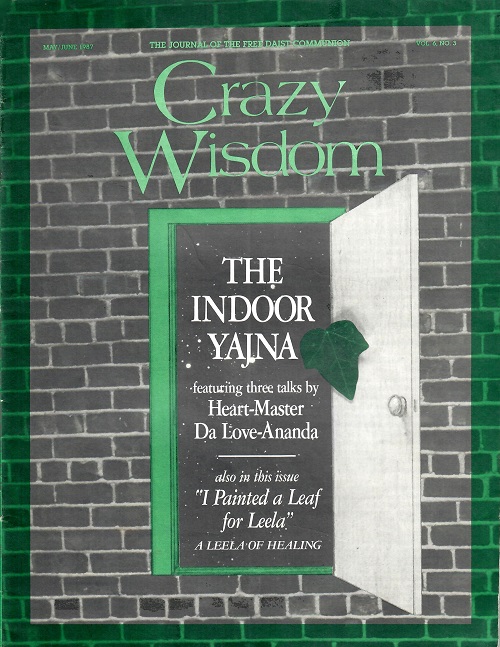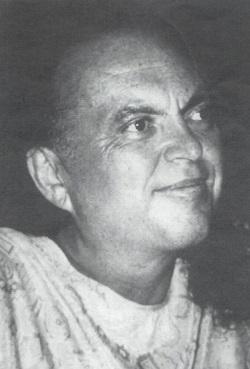

Indoor Yajna – A Summary of Adi Da’s Teaching work (1972-1986) affirming all devotees were in the ‘listening‘ phase of practice.
***
HEART-MASTER DA: I am glad you understand the transition to practicing stage 1.1 a little better, but on the other hand I made it plain already in our considerations over all these months. I am sure that I have discussed it thoroughly many times, not only in this gathering period, but also long before. Simply because I have made the transition plain does not mean that you understand it. This particular individual did not quite understand it, and now that I have said a few words, she says she understands it better, but where were you all? I had already considered this transition and made it plain, so why couldn’t you help her? That is your business outside of these gatherings. Do not require me to perpetuate gatherings, to say something over and over again, to wait for the right moment when somebody is completely ready to understand what I am saying. My business is to make the Way plain once and for all. You are to live it out, make use of it constantly in conversation with one another. You should have long ago observed this woman’s-or anyone else’s-incomplete understanding of this particular transition and then have helped her to understand it.
(Turning to another student) Well, what about you relative to this transition?
PRACTITIONER: At our last gathering I told you that for a couple of months I had been going through a crisis. I had to confront my egoic motivation to self-fulfillment.
HEART-MASTER DA: Self-pleasuring, you said.
PRACTITIONER: Yes. And that was in contrast to something that I had felt or believed all my life, which was that I only wanted God. Since I was very young I always felt that.
HEART-MASTER DA: But you wanted God to pleasurize you. (Laughter.)
PRACTITIONER: Exactly. I wanted to escape, basically.
HEART-MASTER DA: That is why I call it self-transcending God-Realization. If all you want is God, then you must really want to transcend yourself. You cannot want only God and want to be just yourself, fully self-possessed and pleasurized and fulfilled and consoled by the presumed deity.
PRACTITIONER: Right.
HEART-MASTER DA: To come to an understanding of what the Divine is and what the Divine is not is part of the student consideration.
The ego proposes God. The ego makes religion, and egos talk religion, just as Realizers talk religion. But they are talking about two different Gods-or perhaps many different Gods. Therefore, fundamental to student sadhana is the consideration of the Way of the Heart and the entire Great Tradition, consideration of the Divine, of God-Realization, of what God-Realization involves.
What is God? To be moved toward God-Realization in the Way of the Heart is to be moved toward self-transcendence in God and, therefore, it is to be moved toward the Divine based on a unique understanding of what the Divine Is. You can use many alternative words. I use the word God, or the Divine, but I use many other words also. Truth Itself, Reality Itself, Realization of Reality or the Real Condition, Perfect Self-Realization-these are equivalent phrases.
The Divine that is considered and that is to be Realized in the Way of the Heart is not the conventional God of common egoic religion, or even the God of religion in the context of any of the first six stages of life. What is considered and Realized in this Way is Real God, the Very Divine or Ultimate Condition as confessed by the Realizer in the context of the seventh stage of life. That God or Reality is not proposed to students or to practitioners of the Way as an ideal. Rather, you are called to consider the Way of the Heart and the Great Tradition altogether, and, if you come at heart, most fundamentally, to the conclusion that the Divine or That which is to be Realized is of such a Nature as I confess It to be-if, in other words, it is your own confession-then you can take up the Way of the Heart as a full discipline.
You must have a unique understanding of the Divine even to enter practicing stage 1.1. If you do not have this unique understanding, you might propose God-Realization or God-Communion without self-transcendence, based on a self-fulfilling motive, and that is not the Way of the Heart. You could assume the disciplines of practicing stage one and think that you are practicing the Way of God-Realization, but you would not be practicing the Way of the Heart.
The Way of the Heart is the specific process of self-transcendence carried to the perfect degree of Realization of That which is Realized necessarily, inherently, and obviously when the self is perfectly transcended. Another way of describing the Divine is to say that the Divine is simply That which is Obvious when the self-contraction is absent. Therefore, in my language the Divine is not a theological or historical proposition based on a variety of myths. The Divine is simply That which is Real, which is simple, which is Obvious when the self-contraction is utterly transcended. That which is Obvious can be called the Divine or God or Truth or Reality or any other of the many descriptive terms I have used.
You cannot be a practitioner of the Way of the Heart itself at practicing stage l. l and beyond until you come to a basic understanding about the nature of life, the Nature of the Divine, the nature of the Process of Realization. Necessarily, then, student sadhana involves self-observation, because you must inspect your motive toward Realization, however you describe it. This is why “self-transcending God-Realization” is the key description in the Way of the Heart, not merely the motive toward God-Realization.
The motive toward God- Realization may be said to be characteristic of all the first six stages of life, whereas the motive toward self-transcending God-Realization is a Way that may be engaged in the context of all of the first six stages of life, but is even from the beginning informed by the disposition or characteristic Realization associated with the seventh stage of life. Therefore, the Confession of the seventh stage of life, my own Confession to you of Realization, serves and informs practitioners, even at the very beginning of this Way. As you say, then, recently you have been considering your motives, your tendencies.
PRACTITIONER: At that time I felt completely steeped in my egoic motives, which I had never confronted so strongly. I had always had an illusion about myself that was being completely shattered now.
HEART-MASTER DA: You thought you wanted God, but you wanted God to want you.
PRACTITIONER: I wanted to be the beloved. I thought I was the beloved.
HEART-MASTER DA: God is the Beloved! You must transcend yourself to have anything to do with that Beloved. Otherwise that One is not beloved.
PRACTITIONER: I felt how much I didn’t want to transcend myself, how completely self-possessed I was. At the time all I wanted to do was get as far away as I could from the demand of practice, which I was just discovering the reality of.
HEART-MASTER DA: That, of course, is not the expression of a practitioner of the Way of the Heart. But it may be, as it is for you, an expression of someone considering the Way of the Heart as a student does. You may still exhibit the evidence of this dramatization, or this tension, until you do truly awaken to the self-transcending motive of perfect Realization of That which is Realized only in the case of perfect self-transcendence. When you truly know that that is your motive, that that is your disposition-whatever tendencies are present in the body-mind-when you can truly confess that Heart-disposition as fundamental to your being, then you can apply to practicing stage 1.1. The sadhana is still to be done, though. Therefore, the first thing to recover is this informed urge, the informed Heart-disposition, the intelligent disposition. Then the Heart Itself is to be Realized through self-transcending practice.
PRACTITIONER: Ultimately I felt very served by that period of time, because I felt much more established in a real picture of myself and a real understanding of the sadhana of this Way as opposed to what I had thought it was and what I had been involved in all my life.
HEART-MASTER DA: Your particular dilemma characterizes everybody who has been involved in this Way to this point. The entire community was operating on that principle, totally counter to my Wisdom-Teaching. It is not that I had not considered the matter. Rather, the motive toward self-fulfilling “realization” is the motive of egoity. This motive, not clarified by true hearing, was moving practitioners to falsely assume advancement and competence in their practice.
But notice that everyone bypassed the beginning. They felt already equipped with the self-transcending disposition. What they were really equipped with, however, was the self-fulfilling disposition, the movement to be fulfilled by the Teaching Word, fulfilled by idealistic performance of this Way, fulfilled by association with me and the community. Everyone was moved to be satisfied, fulfilled, consoled, and was struggling against the reality of life in our Way and in my Company, which only serves the self-transcending impulse. You were all struggling with this Way, even while calling yourselves devotees.
PRACTITIONER: Actually avoiding it.
HEART-MASTER DA: Directly avoiding it, strategically avoiding it, though perhaps without full consciousness, without fully inspecting what you were doing.
I have always tried to help you to inspect your motives. All the years of Teaching, including these last many months of gatherings, were about helping you do that. The fundamental consideration in this recent period has been the inspection of the motive toward self fulfillment through various designs as opposed to the self-transcending process that is the Way of the Heart itself. Having entered into this consideration in a rather summary sense in the last few months, I am looking for the signs among you all that this impulse is true of you and that on the basis of that impulse you can assume the disciplines associated with this Way.
The principal discipline is self-observation and consideration of what is observed to the point of hearing and then seeing. I am looking for these signs. Only when I see these signs will I feel that the Communion is established on a sound basis, founded in the true integrity of right association with my Teaching Word and my own Person and Word-my Sign.